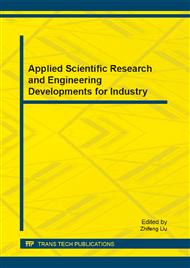p.77
p.81
p.85
p.89
p.93
p.97
p.101
p.105
p.109
Digital Analysis of Hydraulic Cone Valve Turbulence Based on Fluent 3D Solver
Abstract:
The hydraulic cone valve is an important basic component in Fluid drive and control technology. Characteristic of cone valve inner flow filed influences directly the valves performance. Especially when fluid flow in runner is turbulent, characteristics of flow field have great influence on the valves working performance.Main work of this paper is numerical calculation and simulation of cone valve inner runner flow field inside hydraulic hammer. First make a 3D modeling for cone valve using Pro/E, by fluent this paper analyses and discusses the distribution of hydraulic cone valve internal flow field including flow velocity field, pressure field and flow, etc when the cone valve core taper angle is 30°, the gap is 0.5 mm, and inlet velocity is different, analyses position and strength of the vortex, and finds out the main reason for energy consumption.The results of the study show that by the optimal design of the cone valve seat, the density degree of the flow and the size of the vortex is reduced, the energy loss is reduced, negative pressure zone also changes, the noise is reduced and the energy utilization is improved.
Info:
Periodical:
Pages:
93-96
Citation:
Online since:
August 2013
Authors:
Keywords:
Price:
Сopyright:
© 2013 Trans Tech Publications Ltd. All Rights Reserved
Share:
Citation:


